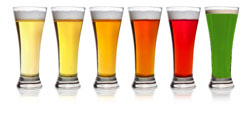Local Columbus blogger, Green Buckeye, recently tagged The Columbus Beer Wench in this post:
“Sierra Club’s Green Life blog has a list of green beers for St. Paddy’s day. Check out the comments, too, where readers share their local favorites and remind us that local brews might have a smaller carbon footprint.
Cleveland’s Great Lakes Brewing Company is the closest brewery mentioned in the article. Do we have any breweries in Columbus making strong attempts to be more sustainable? Maybe The Columbus Beer Wench can help us out!
What’s your favorite local brew?”
Always up for a challenge, I decided to take it upon myself to do some research.
And with St. Patrick’s Day less than 12 hours away — I think it only appropriate to write a blog on “Green Beer.”
In my research, I came across several United States Breweries who are actively committed to being environmental conscientious and use sustainable practices.
The most impressive is the New Belgium Brewing Co., located in Fort Collins, CO.
The following list highlights the beliefs of the New Belgium Brewing Co.:
We believe, to be environmental stewards, we need to:
1. Lovingly care for the planet that sustains us.
2. Steward natural resources by closing the loops between waste and input.
3. Minimize the environmental impact of shipping our beer.
4. Reduce our dependence on coal-fired electricity.
5. Protect our precious Rocky Mountain water resources.
6. Focus our efforts on conservation and efficiency.
7. Support innovative technology.
8. Model joyful environmentalism through our commitment to relationships, continuous improvement, and the camaraderie and cheer of beer
The following list highlights the actual sustainable practices of the New Belgium Brewing Co.:
1. Increased efficiencies in the brewing process
2. Utilized green design throughout our building. (Lighting. HVAC. Materials.)
3. Implemented a process for treating our wastewater
4. On-site energy production
5. Wind-powered electricity since 1999
6. Employ a High Involvement Culture
7. Sustainable Eventing
8. Actionable Advocacya. We’re members of 1% For the Planet, which means that, through donations and fund-raisers, 1% of our revenue goes to environmental non-profits.
b. Team Wonderbike, our bicycle commuter advocacy program, has more than 10,000 members who have pledged to offset more than eight million car miles by riding their bikes more over the next twelve months.
c. Public speaking/education: Because we make and sell beer, people are interested in our story. We’ve been very successful while being values-driven and we we strive to be a business role model.
d. To encourage sustainable transportation, every employee gets a custom cruiser bike after one-year of employment.
- Constant benchmarking
- Partnering to support innovative technology
The following is a list of additional breweries around the U.S. who are also committed to sustainable practices:
- Brooklyn Brewery – In 2003, Brooklyn Brewery became the first NYC company to switch to 100% wind-generated electricity. It also pays farmers in New Jersey to swing by and pick up the “spent grain” — the remaining husks that are left over after brewing. The farmers then feed the nutritious grains to their livestock, making good use of Brooklyn Brewery’s waste.
- Odell’s Brewing Co. – Odell’s is actively helping reduce greenhouse gas through solid waste (paper, glass, plastic, etc.) recycling; staggering production to avoid using energy during peak demand times; investing in and using renewable energy sources; using skylights for natural light; promoting the “Bike to Work Day” Business Challenge and the “Drive Less” Challenge. They use wind power for 100% of their electrical needs, reducing the demand for conventional, fossil-fuel-burning energy and reducing emissions of CO2, particulate matter and other pollutants. Odell’s also fuels all their diesel trucks with biodiesel, a renewable fuel made from American-grown vegetable oilseed crops.
- Sierra Nevada Brewing Co.: Sierra Nevada uses a combination of fuel cells and solar panels. They have made great strides around recycling, heat recovery, carbon-dioxide recovery, water conservation, and energy efficiency. In an effort to quantify and begin reductions, Sierra Nevada joined the California Climate Action Registry. The Registry is a voluntary reporting program that allows us a way to report and certify our GHG emissions
- Wolavers and Butte Creek offer organic pale ales, IPAs, porters, stouts, etc.
The closest eco-friendly brewing company to Columbus, OH is the Great Lakes Brewing Co. in Cleveland, OH.
Great Lakes Brewing Company is an environmentally and socially conscious brewer of award-winning, all natural beer. The care that goes into the beer resonates from a commitment to the community and environment, otherwise known as the “Triple Bottom Line” – to engage in economic, social and environmental practices that achieve a sustainable, yet profitable, business. These include:
- Reducing, reusing and recycling
- Changing natural resource use from “Take, Make, Waste” to “Take,
Make, Remake”- Implementing efficient energy practices
- Investing in the community through non-profit organizations
- Supporting sustainable urban renewal projects
The three waves in the company logo not only reflect this Triple Bottom Line philosophy, they represent a concerted effort to the respectful use of beer’s most valuable ingredient – water. Since beer is over 90% water, GLBC understands that quality water translates into a great beer drinking experience, so only the freshest water from the Great Lakes region is used.
Just because the beer itself may not be “green” does not mean that it cannot be consumed “green.” What do I mean by this? Purchasing a beer brewed locally, from the actual location, reduces its carbon footprint. Purchasing the beer from draft or recycling the bottle after consumption also reduces the carbon footprint. What exactly do I mean by carbon footprint?
A Carbon Footprint is made up of the sum of two parts, the direct / primary footprint and the indirect / secondary footprint.
1. The primary footprint is a measure of our direct emissions of CO2 from the burning of fossil fuels including domestic energy consumption and transportation (e.g. car and plane).
2. The secondary footprint is a measure of the indirect CO2 emissions from the whole lifecycle of products we use – those associated with their manufacture and eventual breakdown.
The Wench’s tips to reducing your beer’s carbon footprint:
- Bike or walk to a local brewery.
- Purchase a beer made on-site.
- Drink a draft. Recycle the bottle after consumption.
- Serve as an environmental steward by encouraging your local breweries to partake in more sustainable practices!
Why not make this St. Patrick’s Day a little more green by drinking green! I challenge you to drink beers from any of the breweries listed above as well as drinking from our local breweries in Columbus, OH. (Oh, and Green Buckeye — the answer to your question: Barley’s Brewing Co. is my favorite local brewery!)
Happy St. Patrick’s Day. CHEERS!




Another thing about the Great Lakes Brewing company that makes it more eco-friendly:
“Great Lakes Brewing Company’s eco-friendly shuttle bus, “The Fatty Wagon”, operates on straight restaurant vegetable oil and services Cleveland Indians home games.”
Awesome post. I still need to reply to your e-mail. Sorry about the slooooooow response.
Thanks for playing, BW! I’ll have to check out Barleys now.